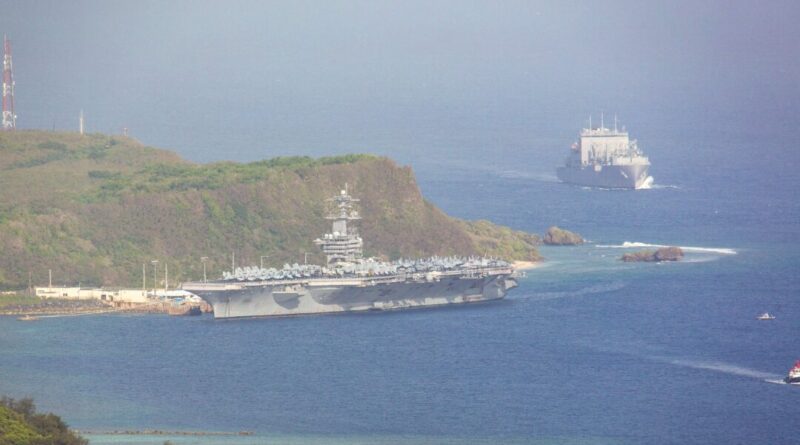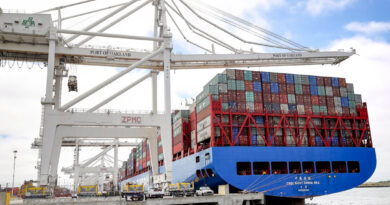‘Guam serves as a strategic outpost in the Western Pacific, playing a vital role in maintaining stability across the region,’ said Capt. Neil Steinhagen.
The U.S. Navy has deployed one of its most advanced attack submarines to Guam, enhancing U.S. presence in the Indo–Pacific amid escalating tensions with communist China.
The USS Minnesota (SSN-783), a Virginia-class fast-attack submarine, and its crew of about 140 sailors arrived at Navel Base Guam on Nov. 26. The arrival was part of the Navy’s “strategic laydown plan” in the region, with its “most capable units forward,” the U.S. Navy
said in a press release.
“This posture allows flexibility for maritime and joint force operations, with forward-deployed units ready to rapidly respond to deter aggression and promote a peaceful and prosperous Indo–Pacific region,” the release reads.
Currently, China has the world’s largest navy, with more than 370 ships, including six nuclear-powered ballistic missile submarines and six nuclear-powered attack submarines, according to a
report published by the Pentagon last year. The report estimated that the Chinese submarine fleet will reach 80 units by 2035.
Navy Adm. Samuel Paparo, head of the Indo–Pacific Command,
called the region the “most stressing theater” at an event held by the Washington-based think tank Brookings Institution earlier this month.
The USS Minnesota joins
four Cold War-era Los Angeles-class fast-attack submarines in Submarine Squadron 15 in Guam. The four older submarines are USS Asheville (SSN-758), USS Jefferson City (SSN-759), USS Annapolis (SSN-760), and USS Springfield (SSN-761).
Virginia-class submarines have better warfighting capabilities, including coastal operations, the U.S. Navy said on its
website. Additionally, these vessels can carry larger payloads and provide their commanding officers with enhanced situational awareness.
“Minnesota is composed of exemplary individuals who represent some of our brightest Sailors in the Fleet. They’re eager to get out into the local community and stand ready to contribute to our strategic objectives and maintain warfighting readiness in the Pacific,” Cmdr. Isaac Pelt, commanding officer of the Minnesota,
said in a statement.
The USS Minnesota was commissioned in 2013 and was the 10th Virginia-class submarine for service, according to the Navy.
The Navy
commissioned the USS New Jersey (SSN-796) in September, bringing the total to 23 active Virginia-class submarines.
“Guam serves as a strategic outpost in the Western Pacific, playing a vital role in maintaining stability across the region,” Capt. Neil Steinhagen, commander of Submarine Squadron 15,
said in a statement.
The USS Minnesota “will enhance our operational capabilities and further strengthen deterrence efforts throughout the Indo-Pacific,” Steinhagen added.
Wilson Beaver, the policy adviser for defense budgeting at The Heritage Foundation’s Allison Center for National Security, said the Virginia-class submarines are critical to U.S. national security, according to his
op-ed published in October.
Beaver explained that Virginia-class submarines “are still a generation ahead” of Chinese submarines in areas such as propulsion, weapon systems, and noise-reduction technology.
Guam is located about 3,800 miles from Hawaii and 1,700 miles from Taiwan, a self-ruled island that the Chinese Communist Party (CCP) is aiming to take over.
Guam is also part of the second island chain, which extends from Japan to Micronesia. Taiwan sits at the heart of the first island chain that stretches from the southern Japanese island of Kyushu, the Philippines, to the Malay Peninsula.
For decades, military strategists have viewed the first island chain as a barrier preventing the Chinese regime from projecting its air and naval power to the second island chain and beyond.
The Council on Foreign Relations (CFR) said in an
article published on its website in September that Guam, given its proximity to Asia, could be a “critical logistics hub” in a conflict against China over Taiwan.
The article pointed to Microsoft’s 2023
report, which identified China’s state-sponsored cyber threat group “Volt Typhoon” as having targeted critical infrastructure in Guam and the United States since mid-2021.
“Many believe that this operation was intended to probe for weaknesses that could be exploited to deny the United States the ability to operate from the island during a conflict,” according to the CFR article.





